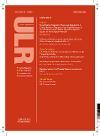Utilities Law Review - Volume 22 - Issue 1

Should Better Regulation Mean Less Regulation? A Critical Review of Aspects of the Implementation of the UK Government's Better Regulation Agenda Against its Five Original Principles
Kate Ollerenshaw
The legislative requirement to set a Business Impact Target ('BIT') and the associated One In, Three Out regime are the latest in a series of deregulatory initiatives that aim to reduce the burden on business from red tape. This article argues that, notwithstanding the political rhetoric, a doctrinal consideration of the mechanisms for achieving the BIT/One In, X Out policies exposes conflicts with the Better Regulation initiative?s own principles of proportionality, consistency, targeting, transparency and accountability. By analysing what regulation the statutory regime requires less of, the processes for identifying and measuring INs and OUTs, and the legislative mechanisms for achieving a reduction in regulatory burden, the author notes a number of tensions with those principles and concludes that the dogged pursuit of 'less' regulation rather than a more holistic quest for 'better' regulation is misplaced.
A Historical Review and Current Analysis of Private Water Provision in England (Part 1)
Dr Michael James Bowes
Eversheds Sutherland LLP
In 2017 the Labour Party manifesto pledged to nationalise (or re-nationalise) the Royal Mail, railway companies, and (among others) water companies. A recent YouGov poll stated that the renationalisation of water would be a popular decision with 59 per cent of those polled favouring public ownership. In comparison, only 30 per cent of those polled favoured public ownership of telephone and internet providers and 53 per cent found this preferable to private energy provision. This article seeks to analyse why private water provision manifested and to what extent the provision is of a 'poorer quality' and 'dysfunctional'. Part 1 of the article details the historical movements of ownership between public and private and discusses the rational for these shifts. Part 2, to appear in the next issue of ULR, will analyse specific elements of water provision since privatisation
Case comments
CAT Written Evidence on the Impact of Brexit on UK Competition Policy
Caroline Hobson
CMS Cameron McKenna Nabarro Olswang LLP, London
In this Comment the author sets out key aspects of the evidence presented to the House of Lords? Internal Market Sub-Committee by the Competition and Markets Authority on the opportunities and challenges of Brexit for UK competition policy. While the CMA does not believe that competition policy will change substantially, it expects to take on the larger, more complex cases previously reserved for the European Commission and perhaps to fulfil a new role in dealing with State Aid
Extending Competition in Electricity Transmission
Richard Goodfellow and Paul Dight
Addleshaw Goddard
The GB energy regulator Ofgem has been considering alternatives to the CATO model for competition in onshore electricity transmission. This Comment considers two possible models, and the background to consultation on the use of the Competition Proxy model for the Hinkley-Seabank project.
Developments in the Maltese Telecommunications Sector
Paul Edgar Micallef
University of Malta
The First Hall of the Civil Court held Transport Malta, the Maltese infrastructure regulator, accountable for failing to afford Midi plc a fair hearing prior to issuing an order authorising Melita Limited, a communications operator, to pass its cables and wires through property owned by Midi. The court noted that even ifthe law does not expressly provide for a fair hearing, a public authority in the exercise of its regulatory functions could not act as if the principles of natural justice did not exist. In the second case, the Administrative Review Tribunal rejected the contestation by Vodafone Malta Ltd of a regulatory decision by the Malta Communications Authority establishing the mobile termination rates that telecoms operators are to pay each other. The Tribunal rejected the various claims relating to, amongst others, lack of consultation and full visibility of the workings used to determine the rates
